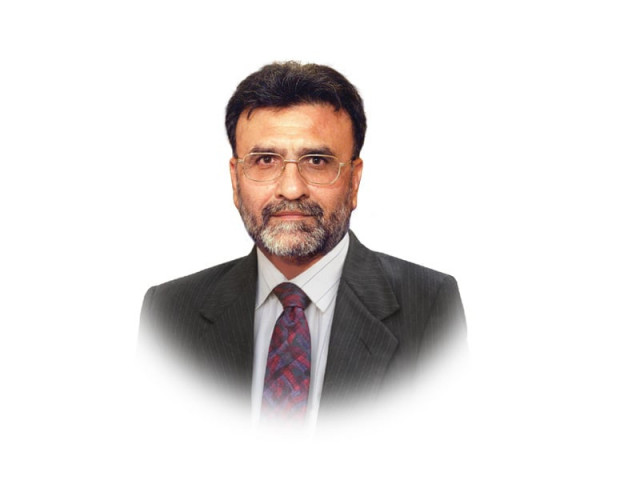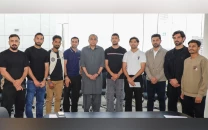Jamaat’s late reaction to what transpired in Dhaka
After offering prayers for his soul, they began forcing the government to help adopt a unanimous resolution.

After offering prayers for his soul, they began forcing the government to help adopt a unanimous resolution. Besides acknowledging the ‘pro-Pakistan role’ of Mollah, the proposed resolution also wanted to condemn the government of Bangladesh for committing the ‘brutal act of’ hanging him.
In the absence of prime minister and his adviser on foreign affairs, no minister had any authority to oblige them. Besides, if you go by the appearances, Bangladesh remains a friendly Muslim country with its own sovereignty and a harsh resolution against its government could lead to serious diplomatic tensions.
Keeping in view their weak numerical position, the JI legislators tried hard to motivate their allies in the PTI for taking the lead in forcing the government to act, as they desired. If really interested, Makhdoom Javed Hashmi could surely have helped them tremendously.
After all, as a rebellious student activist in the early 1970s, Hashmi had begun building his reputation of a rabble-rouser by leading the chants of “Bangladesh Namanzoor” in the streets of Lahore. He, however, was more interested to deliver a speech on law and order and the rest of opposition legislators were simply clueless regarding the explosive story of Mollah. They rather looked completely oblivious to what had really happened in the early 1970s. We are a nation that prefer living in perpetual state of denial anyway and keep sticking to a selective remembrance of history, where all things appear glorious and majestic about us.
But even the post-Bangladesh generations of our erstwhile ‘East Pakistan’ have not forgotten and forgiven. Initially, Sheikh Hasina Wajid was not so interested to prosecute and punish ‘pro-Pakistan’ activists of yesteryear, whom a majority of the Bangladesh youth strongly considered as “treacherous collaborators of the Pak Army against liberation” of their country.
Most ‘pro-Pakistan activists’ had hailed from the ranks of Jamaat-e-Islami. Even after the creation of Bangladesh, the JI in that country continued to provide formidable support to political and military tormentors of Hasina Wajid and her Awami League.
Coming closer to the general election of 2014 in her country, therefore, she slyly decided to take on some prominent ‘collaborators’ by trying them under war crimes.
The sole objective of her populist ploy was to preempt the building of a grand alliance of multiple political parties against the Awami League with active participation of the JI cadres.
After moving the first piece of her gimmick, however, she lost control of the whole game. The civil society of Bangladesh hijacked ‘the cause’ with fierce staging of pickets in the name of “Shahbagh movement.” We in the media disregarded the ferocity of that movement for whatever reason. Yet, our indolence does not condone Jamaat-e-Ismai’s silence over the plight of their former colleagues.
Syed Munawwar Hassan and his party rather seem to have abandoned their erstwhile comrades. Instead of activating their cadres for the defence of detained JI leaders in Bangladesh, the Jamaat-e-Islami of Pakistan preferred to lead ferocious rallies against the arrest of Dr Afiya Siddiqui. Later, Munawwar Hassan and his party switched their fury against the drone strikes and these days the zealous cadres of the same party are obsessively busy in blocking containers taking the NATO supplies to Afghanistan by staging pickets on various exit points of Peshawar along with the PTI youth.
Even in the national assembly, the JI legislators never made any serious attempt to force a serious discussion on what was happening to “the friends of Pakistan” in Bangladesh. With a sincerely launched campaign, the JI could inspire many civil society activists in Pakistan to join them in building substantive pressure on Hasina Wajid.
Pakistan, for example, has to abandon the practice of hanging even the hardened criminals, sentenced to death for committing some heinous crimes. Our government did this to extract concessions for textile exports to European Union countries.
Bangladesh has been relishing far better facilities for the same kind of exports since decades. Cultivating friends and allies from among the civil society activists of Pakistan, the Jamaat-e-Islami could manage some protection for its ‘eminent veterans’ by intelligently focusing on the issue of hanging someone for political reasons only. Sadly, the Jamaat never bothered and remained feeling so excited and busy with its ‘anti-American Jihad.’ It must but blame itself for abandoning the likes of Mollah.
Published in The Express Tribune, December 14th, 2013.



1733130350-0/Untitled-design-(76)1733130350-0-208x130.webp)















COMMENTS
Comments are moderated and generally will be posted if they are on-topic and not abusive.
For more information, please see our Comments FAQ